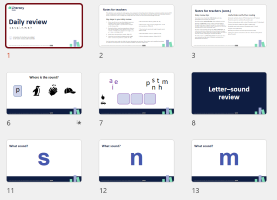Daily review example
Categories
Audience
Purpose
Topic
Details
Source
Literacy Hub
Copyright
(c) Commonwealth of Australia
Overview
This slide pack provides a sample daily review, a key component of teaching phonics following a systematic synthetic phonics (SSP) model, using evidence-based research. It can be adapted to follow any phonics progression or lesson.
Who is this document for?
Foundation to Year 2 teachers; school leaders.
What will you learn?
How to conduct a daily review as part of a phonics lesson.
Related content
Phonics instructional model for reading and spelling
This phonics instructional model for reading and spelling outlines the attributes of instruction, a lesson and review model, a sample phonics lesson and examples of skill application tasks.
Phonics professional learning: Explicit direct instruction for phonics – an instructional model
The Literacy Hub provides free, online professional learning to support schools through each step of building a systematic synthetic phonics (SSP) approach for reading and spelling. This second topic in the series unpacks explicit direct instruction and an instructional model for phonics.
Introduction to SSP video series
Jocelyn Seamer, an expert in systematic reading instruction, presents a series of videos about systematic synthetic phonics (SSP). View the first video in the series.
Back to search results
